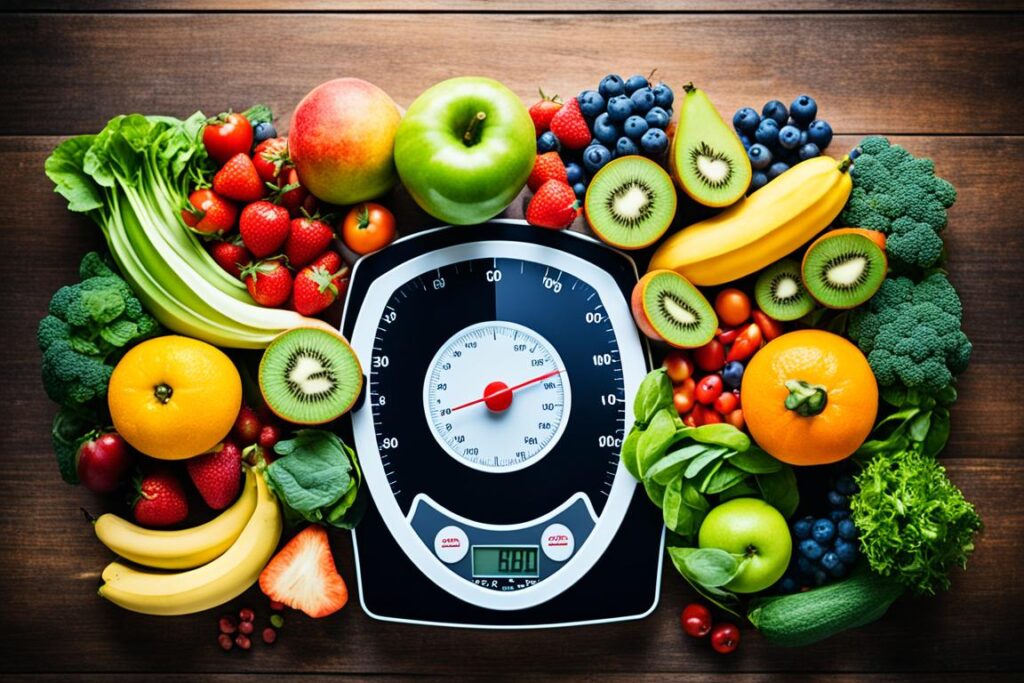Can you really lose weight without working out? Many think exercise is the only way to drop pounds. But, you’d be surprised that healthy weight loss methods exist without breaking a sweat. Techniques like chewing your food well, eating more protein, and drinking lots of water can help you meet your goals. Plus, habits such as mindful eating and cooking at home stop weight gain and keep you healthy over time. Want to learn how shedding pounds without exercising can work for you? Keep reading to discover these smart strategies.
Key Takeaways
- Chewing food thoroughly and eating slowly can lead to decreased food intake and increased fullness.
- Slow eaters tend to have a lower BMI compared to fast eaters.
- A high-protein diet is linked to greater weight loss compared to a standard protein diet.
- Preparing meals at home can help prevent weight gain more effectively than dining out.
- Viscous fiber found in plant foods can aid in satiety and reduce overall food intake.
Eat Nutrient-Dense Whole Foods
Whole foods full of nutrients are essential for our body. They have vitamins, minerals, and more for our daily needs and health. Adding these foods to your diet can make life better. It lowers the risk of getting sick and helps keep a healthy weight. Let’s look at why these foods are good for us.
What are Nutrient-Dense Foods?
Foods rich in nutrients but low in calories are called nutrient-dense. This includes fruits, vegetables, grains, and proteins like fish and nuts. For example:
| Food | Calories per Cup | Water Content |
|---|---|---|
| Raisins | 480 | Low |
| Grapes | 104 | High |
| Grapefruit | 64 (half) | 90% |
| Carrots | 25 (medium) | 88% |
| Air-popped Popcorn | 30 | High |
| Whole-wheat Bread | Variable | Moderate |
Benefits of Nutrient-Dense Foods
Choosing whole foods over processed ones has many perks:
- Improved Weight Management: They have fewer empty calories. Eating grapes over raisins, for example, can cut calorie intake.
- Better Hydration: Foods like grapefruits and carrots are mostly water, helping you feel full without heavy calories. This helps stay at a good weight.
- Enhanced Nutrient Intake: Grains, veggies, and beans are must-haves for health. Whole-grain products have more fiber, aiding digestion.
- Reduced Chronic Disease Risk: Eating more plants can lower the chance of heart disease. Such foods have nutrients and antioxidants important for health.
Adding nutrient-dense whole foods to your meals is key for both a healthy body weight and getting the nutrients you need. For lasting health, choose these nutrient-rich, satisfying foods.
Importance of Hydration in Weight Loss

Understanding how water affects weight loss is key. It acts as a natural appetite reducer, helps to cut calories, and boosts metabolism. Research shows that drinking 200–250 milliliters of warm water after meals aids in losing weight and lowering BMI.
Increase Water Intake
Drinking more water is vital for losing weight. It fills you up before meals, leading to eating less. A 2016 study found that people who drank two glasses of water before meals ate 22% less.
Replacing drinks full of sugar and calories with water is also effective. This change aids in better weight management.
To drink more water, try these tips:
- Drink a glass of water before each meal.
- Carry a reusable water bottle and refill it throughout the day.
- Incorporate water-rich foods like fruits and vegetables into your diet.
- Try infusing water with fresh fruits or herbs for added flavor and nutrients.
Avoid Sugary Drinks
Avoiding sugary drinks is key in staying hydrated the right way. These drinks add unnecessary calories and sugar, leading to weight gain and health problems. Choosing water instead cuts daily calories and supports a healthy weight. Studies show that replacing diet drinks with water results in more weight loss for overweight and obese women.
Drinking cooled water may also increase calorie burning by 23 calories a day. This suggests cold water might aid further in weight loss efforts. Hydration for weight loss means not just drinking water, but also making healthier drink choices. Cutting out sugary drinks helps in your weight loss journey and boosts overall health.
Practice Mindful Eating
Mindful eating can help you manage your weight and have a better food relationship. It makes you more aware of hunger and fullness signals. This can help you control how much you eat.
Techniques for Mindful Eating
There are many ways to practice mindful eating:
- Use smaller plates and bowls: Smaller dishes help you eat less by making portions look bigger.
- Eat slowly: Chewing well and enjoying each bite can make you feel full sooner.
- Avoid electronic distractions: Eating without screens lets you focus on your food and how you feel.
- Engage your the senses: Paying attention to all five senses can make eating more enjoyable and satisfying.
A study of 34 women showed mindful eating can lead to weight loss. After 12 weeks of mindful eating training, they lost an average of 4 pounds. They also felt better about themselves.
Mindful eating also helps with emotional and external eating issues. Using mindful eating methods can prevent overeating. It aligns your eating with your real needs.
Reviews of studies have found mindful eating as good for weight loss as diets. A 2019 review said it could improve gut health by lowering stress. This way, you eat better, avoid overeating, and enjoy your food more.
How to Lose Weight Without Exercise

If you aim to lose weight but dislike the gym, several tactics can aid you. Techniques include chewing food well, slowing down your eating, using smaller dishes, and boosting protein intake. These methods also help with portion control, which is a big part of losing weight.
Chew Thoroughly and Slow Down
Chewing your food well and eating slowly is an easy trick. It makes you feel full with less food. Studies show that people who eat slowly are likely to be slimmer.
Use Smaller Plates
Smaller plates help you think you’re eating more than you are, making it easier to eat less. It’s a straightforward way to manage how much you eat each day.
Eat More Protein
Adding more protein to your diet helps with weight loss, even if you don’t exercise much. Protein makes you feel full, helps control blood sugar, and is good for your diet. Eating a high-protein breakfast can decrease hunger and support weight loss.
Proteins are key for effective weight loss. Here’s a look at different protein sources:
| Protein Source | Satiation Level | Health Benefits |
|---|---|---|
| Lean Meats | High | Builds muscle mass, supports bone health |
| Plant-Based Proteins | Moderate | Improves blood sugars, supports heart health |
| Eggs | High | Rich in nutrients, supports eye health |
| Fish | High | Rich in omega-3, supports cognitive health |
Combining these eating tips with mindful practices and good sleep can lead to successful weight loss without hard exercise. This well-rounded method helps you lose weight in a safe and lasting way.
Conclusion
Choosing sustainable ways to lose weight is more than looking at the scale. It means making lifestyle changes for better health. When you eat foods rich in nutrients, your body gets what it needs, which helps with weight loss over time.
Avoiding sweet drinks and drinking more water cuts calories and boosts your energy. Being mindful about how much you eat affects your food relationship. It helps you eat only when you’re truly hungry.
Eating more protein makes you feel full longer. It also helps you manage your weight without tough exercise schedules. Adding these habits to your daily life helps you stay healthy.
Enough sleep and managing stress are key to a balanced weight loss plan. Changing how you eat and aiming for long-term goals betters your health overall. These positive changes lead to a happier and healthier you.
FAQ
Q: What are some natural ways to lose weight without exercise?
Q: What are nutrient-dense foods?
Q: How does drinking more water contribute to weight loss?
Q: What are the benefits of mindful eating?
Q: How can I reduce my calorie intake without exercising?
Q: What are some healthy weight loss methods without going to the gym?
Q: Why is it important to avoid sugary drinks?
Q: What are some tips for maintaining weight loss long-term without exercise?
Source Links
- 9 Proven Ways to Lose Weight Without Diet or Exercise
- How To Lose Weight Without Exercise, According To Experts
- How to Lose Weight Without Exercise
- The simple math that helps you feel full on fewer calories
- What Is a Whole-Foods Diet? Benefits, Risks, Food List, and More
- What to Eat on a Whole Foods Diet
- How Drinking More Water Can Help You Lose Weight
- Yes, drinking more water may help you lose weight
- 6 reasons why drinking water can help you to lose weight
- Mindful Eating 101 — A Beginner’s Guide
- Can You Practice Mindful Eating While Trying to Lose Weight?
- 8 Mindful Eating Tricks to Help You Lose Weight
- 20 Ways to Lose Weight Without Exercise – Nutrisense Journal
- If You’re Looking to Lose Weight Without Exercise, Check Out These 15 Science-Backed Tips
- How to lose weight without exercise – Evergreen Life
- How to lose weight without diet or exercise: 14 ways
- How to Reduce Weight Without Exercise: Proven Strategies and Science-Backed Methods – PharmEasy Blog
- Weight-Loss and Maintenance Strategies – Weight Management